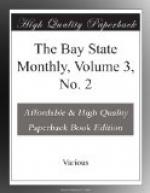And by all the cardinalls solempnelye
I was crowned an emperor.
One winter there I mad abode;
Then word to mee was brought
Howe Mordred had oppressed the crown;
What treason he had wrought.
Att home in Brittaine with my queene:
Therefore I came with speed
To Brittaine back with all my power
To quitt that traterous deede.
And soon at Sandwich I arrivde
Where Mordred me withstoode.
But yett at last I landed there
With effusion of much blood.
Thence chased I Mordred away
Who fledd to London right,
From London to Winchester, and
To Comeballe took his flight.
And stile I him pursued with speed
Tile at the last wee mett:
Uhevby an appointed day of fight
Was there agreed and sett
Where we did fight of mortal life
Eche other to deprive,
Tile of a hundred thousand men
Scarce one was left alive.
There all the noble chevalrye
Of Brittaine took their end
Oh see how fickle is their state
That doe on feates depend.
There all the traiterous men were slaine
Not one escapte away
And there dyed all my vallyant knights
Alas! that woful day!
Two and twenty yeere I ware the crown
In honor and grete fame;
And thus by deth[4] suddenlye
Deprived of the same.
Some distinguished English critics, like Warton and Dr. Warburton, maintain that the materials as well as the taste for romantic fiction were derived almost exclusively from the Arabians. They assume therefore that the traditions, fables and mode of thought in Northern Asia from whence the Scandinavians and Germans are supposed to have originated, were identical with those which the secluded people of Arabia afterwards incorporated into their literature. It is more natural to assume that there is always a similarity in the mythologies, as in the manners, religion, and armor of rude ages and races. Respect for woman was a characteristic of the northern nations of Europe, and not of the Mohammedans. This is an all pervading element in romantic and chivalric fiction. The Northmen believed in giants and dwarfs; in wizzards and fairies; in necromancy and enchantments; as well as the Oriental natives. It is reasonable, therefore, to assume that the immense tide of song which inundated Europe from the eleventh to the sixteenth century, under the form of metrical romances, ballads, and songs, was made up of confluent streams from classical, Oriental, and Gothic mythologies. The Troubadours of Province (from Provincia, by way of eminence), the legitimate successors of the Latin citharcedi, the British bards, the northern scalds, the Saxon gleemen, and English harpers, all contributed in turn to form English minstrelsy and French romance. The Latin tongue ceased to be spoken in France about the ninth century. The




